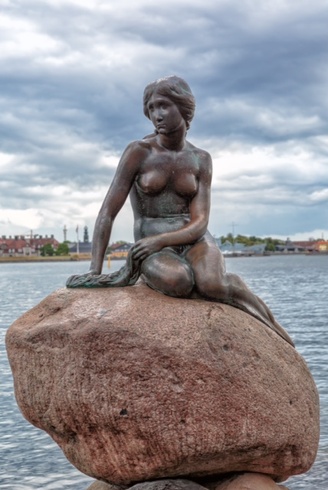
“The Little Mermaid” by Edvard Eriksen, Copenhagen (Avda-berlin, Creative Commons)
I’ve been living the past week with someone who
murmurs, laughs and groans when she reads. Especially when immersed
in a book about what’s generally acknowledged as the world’s happiest
country, Denmark (tip of the hat to Bhutan). (The USA ranks #13
according to the “World
Happiness Report” for 2017.)
Waking this morning to news of “We hate Obama, so we’re going to ditch Obamacare” vote, her chuntering knew no bounds. (Chunter = to complain aloud when you think no one can hear you, you won’t find it in a dictionary.)
Cue guest column. You tell ‘em, girl:
Today’s news that the House passed the Republican health care bill came just after I finished reading a memoir called The Year of Living Danishly, in which the British author Helen Russell and her husband try living in rural Denmark (he gets a job at Legoland) for a year. By the end of the year, they’re surprised by how much they like it and decide to stay.
She shares her personal observations on Denmark’s high taxation rate, the social welfare state, relaxed working hours, professionalized child care workers and subsidized child care, and a culture that really lives up to its value of equality: in the social clubs that abound, CEOs mix with janitors, and no one gains special status because of their title or earnings. Because Denmark has consistently been rated one of the happiest countries on earth, Russell routinely asks people she meets how happy they are, and to a person, they usually say between 8-9 on a scale of 1-10. (“A 10 would be boasting,” as one explained to her, and boasting is frowned upon).
I was struck by the fact that the Danes she meets do not resent or complain about their high taxes; they think they’re fair, since everyone sooner or later will benefit from the excellent, high-quality services provided by tax money.
Coming from Britain, Russell and her husband are already products of a social welfare state (although, post-Thatcher, much less than the one Barry grew up in). Still, much of Danish culture surprised her, as it did me. Though I’m progressive by U.S. standards, reading her deceptively light-hearted memoir jolted me and made me realize how conditioned I am by our US system. Our value of hyper-individualism is so deeply baked into our culture, I wonder how much any of us are really aware of it. Reading about Denmark made me wonder: Could their way of life—one seriously different from ours in many ways—really work better for more people, myself included? I think so, though I can’t see it happening.
Meanwhile, here we are with our messy, mishmash Affordable Care Act, a raggedy piece of cloth compared to what Denmark, Britain, Canada, or France have, but it was something; a start, at least. Now even that is beginning to shred.
CLICK TO MANAGE